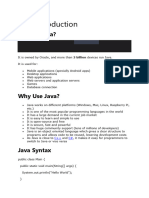Learn Java - Introduction - Variables Cheatsheet - Codecademy
Uploaded by
missphosphorusLearn Java - Introduction - Variables Cheatsheet - Codecademy
Uploaded by
missphosphorusCheatsheets / Learn Java: Introduction
Variables
boolean Data Type
In Java, the boolean primitive data type is used to boolean result = true;
store a value, which can be either true or false .
boolean isMarried = false;
Strings
A String in Java is a Object that holds multiple // Creating a String variable
characters. It is not a primitive datatype.
String name = "Bob";
A String can be created by placing characters between
a pair of double quotes ( " ).
To compare Strings, the equals() method must be // The following will print "false"
used instead of the primitive equality comparator == .
because strings are case-sensitive
System.out.println(name.equals("bob"));
int Data Type
In Java, the int datatype is used to store integer int num1 = 10; // positive value
values. This means that it can store all positive and
int num2 = -5; // negative value
negative whole numbers and zero.
int num3 = 0; // zero value
int num4 = 12.5; // not allowed
char Data Type
In Java, char is used to store a single character. The char answer = 'y';
character must be enclosed in single quotes.
Primitive Data Types
Java’s most basic data types are known as primitive int age = 28;
data types and are in the system by default.
The available types are as follows:
int char grade = 'A';
char
boolean
boolean late = true;
byte
long
short byte b = 20;
double
float
long num1 = 1234567;
null is another, but it can only ever store the value
null .
short no = 10;
float k = (float)12.5;
double pi = 3.14;
Static Typing
In Java, the type of a variable is checked at compile int i = 10; // type is int
time. This is known as static typing. It has the advantage
char ch = 'a'; // type is char
of catching the errors at compile time rather than at
execution time.
Variables must be declared with the appropriate data j = 20; // won't compile, no
type or the program will not compile.
type is given
char name = "Lil"; // won't compile,
wrong data type
final Keyword
The value of a variable cannot be changed if the // Value cannot be changed:
variable was declared using the final keyword.
final double PI = 3.14;
Note that the variable must be given a value when it is
declared as final . final variables cannot be
changed; any attempts at doing so will result in an error
message.
double Data Type
The double primitive type is used to hold decimal double PI = 3.14;
values.
double price = 5.75;
Math Operations
Basic math operations can be applied to int , double int a = 20;
and float data types:
int b = 10;
+ addition
- subtraction
* multiplication int result;
/ division
% modulo (yields the remainder)
result = a + b; // 30
These operations are not supported for other data
types.
result = a - b; // 10
result = a * b; // 200
result = a / b; // 2
result = a % b; // 0
Comparison Operators
Comparison operators can be used to compare two int a = 5;
values:
int b = 3;
> greater than
< less than
>= greater than or equal to boolean result = a > b;
<= less than or equal to // result now holds the boolean value
== equal to
true
!= not equal to
They are supported for primitive data types and the
result of a comparison is a boolean value true or
false .
Compound Assignment Operators
Compound assignment operators can be used to int number = 5;
change and reassign the value of a variable using one
line of code. Compound assignment operators include
+= , -= , *= , /= , and %= . number += 3; // Value is now 8
number -= 4; // Value is now 4
number *= 6; // Value is now 24
number /= 2; // Value is now 12
number %= 7; // Value is now 5
Increment and Decrement Operators
The increment operator, ( ++ ), can increase the value int numApples = 5;
of a number-based variable by 1 while the decrement
numApples++; // Value is now 6
operator, ( -- ), can decrease the value of a variable by
1.
int numOranges = 5;
numOranges--; // Value is now 4
Order of Operations
The order in which an expression with multiple
operators is evaluated is determined by the order of
operations: parentheses -> multiplication -> division ->
modulo -> addition -> subtraction.
Casting
Casting is the process of transforming a value of one // Convert double to int
primitive data type to another.
double numDouble = 12.99;
A double value can be transformed into an int value
using the (int) casting operator, while an int value System.out.println((int)doubleNum); //
can be transformed into a double value using the Prints: 12
(double) casting operator.
// Convert int to double
int numInt = 9;
System.out.println((double)numInt); //
Prints: 9.0
Print Share
You might also like
- 2 - Learn Java - Variables Cheatsheet - CodecademyNo ratings yet2 - Learn Java - Variables Cheatsheet - Codecademy4 pages
- Learn Java - Variables Cheatsheet - CodecademyNo ratings yetLearn Java - Variables Cheatsheet - Codecademy4 pages
- Wireframing, Java Variables, and Android Studio - Variables Cheatsheet - CodecademyNo ratings yetWireframing, Java Variables, and Android Studio - Variables Cheatsheet - Codecademy4 pages
- Learn Java_ Variables Cheatsheet _ CodecademyNo ratings yetLearn Java_ Variables Cheatsheet _ Codecademy4 pages
- FPP Day 2 - Fundamental Programming StructuresNo ratings yetFPP Day 2 - Fundamental Programming Structures24 pages
- Funadamental Programming structures in JavaNo ratings yetFunadamental Programming structures in Java88 pages
- Introduction To JAVA: - Platform Independent - SecuredNo ratings yetIntroduction To JAVA: - Platform Independent - Secured29 pages
- Variables, Datatypes and TypeconversionNo ratings yetVariables, Datatypes and Typeconversion36 pages
- OCA Java SE8: Boolean True Byte 123 Short 123 Int 123 Long 123 Float 123.45f Double 123.456 Char 'A'No ratings yetOCA Java SE8: Boolean True Byte 123 Short 123 Int 123 Long 123 Float 123.45f Double 123.456 Char 'A'3 pages
- 03 - CSC 202 - Basics of Java ProgrammingNo ratings yet03 - CSC 202 - Basics of Java Programming11 pages
- Java Basic structure, Identifiers, Data types and OperatorsNo ratings yetJava Basic structure, Identifiers, Data types and Operators8 pages
- Primitive Data Types and Arithmetic Operations: CS0007: Introduction To Computer ProgrammingNo ratings yetPrimitive Data Types and Arithmetic Operations: CS0007: Introduction To Computer Programming28 pages
- Presentation Deck - Cloud Security Fundamentals What Every Builder Needs To KnowNo ratings yetPresentation Deck - Cloud Security Fundamentals What Every Builder Needs To Know54 pages
- D351528X012 OpenEnterprise v3 SCADA SystemNo ratings yetD351528X012 OpenEnterprise v3 SCADA System16 pages
- 8-/4-/2-Channel, 12-Bit, Simultaneous-Sampling Adcs With 10V, 5V, and 0 To +5V Analog Input RangesNo ratings yet8-/4-/2-Channel, 12-Bit, Simultaneous-Sampling Adcs With 10V, 5V, and 0 To +5V Analog Input Ranges37 pages
- An MDBMS Can Be Characterized by Its Objectives When Handling Multimedia DataNo ratings yetAn MDBMS Can Be Characterized by Its Objectives When Handling Multimedia Data2 pages
- # OSI Model Key Responsibilities Data Type 7 ApplicationNo ratings yet# OSI Model Key Responsibilities Data Type 7 Application3 pages
- Digital Logic Circuit Analysis and Design (Victor Nelson, Troy Nagle, David Irwin & Bill Carroll)100% (5)Digital Logic Circuit Analysis and Design (Victor Nelson, Troy Nagle, David Irwin & Bill Carroll)866 pages
- BTPT ONU Configuration Guide: This Guidance Document Is Applicable To BT-BCM6838 Series Models ONU Equipment of BTPTNo ratings yetBTPT ONU Configuration Guide: This Guidance Document Is Applicable To BT-BCM6838 Series Models ONU Equipment of BTPT10 pages
- Project Report On Employee Management System100% (2)Project Report On Employee Management System30 pages
- Cisco AP541N Wireless Access Point OverviewNo ratings yetCisco AP541N Wireless Access Point Overview2 pages
- Ams 3125 Bearing Vibration Monitor en 39920No ratings yetAms 3125 Bearing Vibration Monitor en 399203 pages
- Bay Control Unit: Figure 1 Typical Substation Communication NetworkNo ratings yetBay Control Unit: Figure 1 Typical Substation Communication Network2 pages

























































































